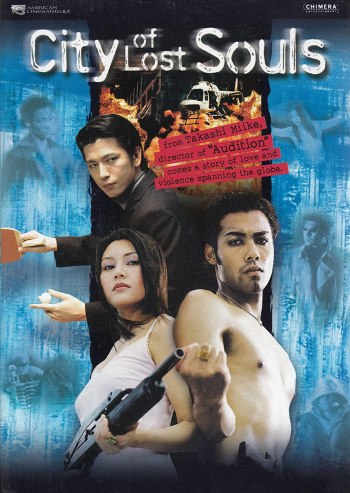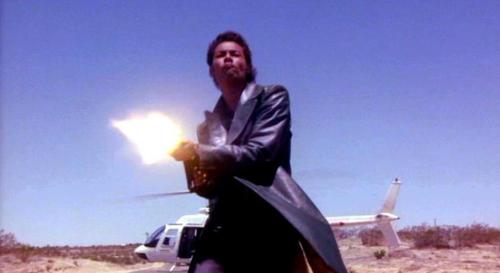Cultures clash on the streets of Tokyo in one of Takashi Miike’s more subdued gangster thrillers.
“In Brazil, we’re Japanese. Here, we’re Brazilian.”
By the turn of the century, Takashi Miike had already made a name for himself as one of Japan’s premiere directors of hyperviolent, often highly bizarre Yakuza b-films. He had already seen success with the Black Society trilogy in the mid-90s, and in 1999 released the first in a new trilogy, Dead or Alive. By the year 2000, it was pretty much guaranteed that he’d release at least one gangster film a year, but the real surprise was always in what direction the story would take.
Even then, Miike was no stranger to thematic, sincere drama – the Black Society trilogy’s Ley Lines proves so – but nevertheless, The City of Lost Souls came as something of a surprise, at least to me, by being considerably more thoughtful than anyone might have guessed. The film follows Mario (Teah), a Japanese-Brazilian, who rescues his Chinese girlfriend Kei (Michelle Reis) from being deported by stealing a helicopter. They plan on leaving together and attempt to rob a local cockfighting ring, inadvertently stealing a suitcase of cocaine bought by gangster Fushimi (Koji Kikkawa) by triad boss Ko (Mitsuhiro Oikawa). With both the yakuza and triads against them, Mario and Kei decide to sell the drugs before the inevitable collateral damage befalls their friends.
The City of Lost Souls touches upon one of Takashi Miike’s most prevalent themes: alienation and acceptance. With the exception of the yakuza and racist cops, every other character in the movie is a foreigner in Japan, which as many people in the real world would attest to, isn’t always the easiest thing. The movie uses these struggles to dictate how the characters act in certain situations. While Lucia (Patricia Manterola), one of Mario’s old flings, struggles to make a better life for an orphaned girl, Ko struts around with an air of superiority as if his criminal endeavours are actually favours for the savage Japanese monkeys (his words).
Mario and Kei are people who fled to Japan to find better lives, and then choose to flee it when things go bad once more, but no matter where they go they won’t be able to escape. Miike chooses to focus on the thematic elements of the story over cartoonish violence, and produces what could be argued as his most mature piece, at least at the time. He’s also eschewed many of his frequent collaborators, choosing instead to work with a wildly varied cast of mixed-race and foreign actors (including Chinese actors playing Japanese characters and vice versa), and the casting shakeup really works in its favour. Matsuhiro Oikawa, for example, plays a massively engaging villain whose monologues make him most memorable.
Where this is something that works against fan expectation I can’t say. But don’t worry if it sounds too much like a departure for the director. There are still plenty of lunatic moments throughout, from the comedy of the cockfighting contestants, to the stylised fight scenes (that trail of blood reading LOVE is a nice touch); they’re just better put together and somewhat better paced than one might be expecting. There are also plenty of questionable moments, lots of odd acting choices and scenes that maybe go a little too silly (the Yu-Gi-Oh style ping pong death match for example) for anyone to mistake this for anything other than what it is. It’s still schlocky b-movie nonsense, but one that’s just a touch more mature and thoughtful. At least, for a movie where CGI chickens fight each other using timely Matrix references.
Verdict: Better than the average for this era of Takashi Miike, The City of Lost Souls dials down the crazy in exchange for good pacing and drama, but your mileage may vary on whether that’s a good thing or not.
Overall entertainment: 8/10
Violence: 6/10
Sex: 0/10
Wackadoo-o-meter: 5/10
Cockfighting: Seriously who keeps betting on this guy?
References: The fact the Matrix one is the only reference of its kind is super jarring and weird
Special attacks: Vodka fire breath always works
City of Lost Souls (2000)
Also known as: 漂流街 (Hyōryū-gai), lit. Drifting City
Japanese, Portuguese, Mandarin
Director: Takashi Miike
Writers: Ichiro Ryu, Hase Seishu (novel)
CAST
Teah – Mario
Michelle Reis – Kei
Patricia Manterola – Lucia
Mitsuhiro Oikawa – Ko
Koji Kikkawa – Fushimi
Sebastian DeVicente – Rckardo
Eugene Nomura – Yamazaki
Terence Yin – Riku
Atsushi Okuno – Carlos




